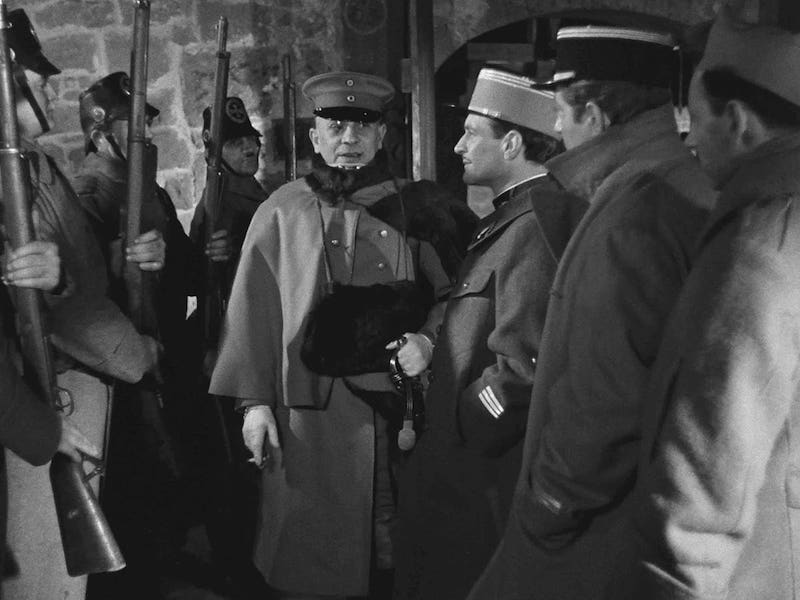#Jean Renoir vs. The Nazis

Table of Contents
“#Jean Renoir vs. The Nazis”
<span class="mx-1">If Joseph Goebbels declares your movie “Cinematic Public Enemy No. 1,” then you’re doing something right.</span>
</p><div id="">
<figure class="sf-entry-featured-media ">
<img width="800" height="600" src="https://filmschoolrejects.com/wp-content/uploads/2012/06/Grand-Illusion-Criterion.jpeg" class="articlethumb wp-post-image" alt="Grand Illusion Criterion" loading="lazy"/> <p>
<span class="sf-entry-flag sf-entry-flag-creditline">The Criterion Collection</span>
</figure>
<!-- START BYLINE -->
<div class="row align-items-center justify-content-center my-4 text-center medium dark-gray">
By Meg Shields · Published on December 27th, 2021
</div>
<!-- END BYLINE -->
<em>Welcome to The Queue — your daily distraction of curated video content sourced from across the web. Today, we’re watching a video essay about the controversy surrounding Jean Renoir’s 1937 anti-war film, La Grande Illusion.</em>
In a 1970 interview, talk show host Dick Cavett asked Orson Welles which films he would save for posterity in the event of a world-ending catastrophe. With very little thought, Welles replied “La Grande Illusion by Jean Renoir and … something else.”
Renoir’s 1937 film is the dictionary definition of a masterpiece. It was the first foreign-language film to be nominated for the Academy Award for Best Picture. And it is (as I’m sure our readers will be keen to learn) spine #1 in The Criterion Collection.
But La Grande Illusion‘s legacy is a miraculous one. An anti-war film released during the rise of fascism, it was nearly destroyed. In the end, the thing that almost led to its destruction was the very thing that saved it: an idealistic plea for peace, brotherhood, and comradery across borders.
Inspired by Renoir’s personal experiences as a reconnaissance pilot during World War I, La Grande Illusion follows a group of French soldiers being held in a German prison camp. Despite their status as prisoners of war, the French soldiers respect their captors and vice versa.
La Grande Illusion is a film about men doing their best to keep their moral and fraternal integrity despite outside pressures. Renoir asks a simple, optimistic question that would ultimately lead to his film being declared “Cinematic Public Enemy No. 1” by Nazi Propaganda Minister Joseph Goebbels. Namely: are wars really inevitable?
As the video essay below details, the fascist powers did everything they could to suppress and destroy all copies of Renoir’s film. But thanks to dedicated cinephiles and a good degree of luck, La Grande Illusion persisted in spite of the best efforts of its enemies.
And while the film was not properly restored to its uncensored glory until 1999 (!), both its perceived threat and its ultimate survival are hard proof of the film’s power.
Watch “Grand Illusion: How an Anti-War Masterpiece Survived the Nazis’ Wrath”:
Who made this?
This video essay on the controversy surrounding Jean Renoir’s 1937 film La Grande Illusion is by CinemaTyler. The Brooklyn-based creator has been providing some of the most in-depth analyses of auteur-driven cinema on YouTube for some time now. You can check out their YouTube channel here. CinemaTyler’s scholarship on Stanley Kubrick, particularly 2001: A Space Odyssey, is noteworthy, and absolutely worth seeking out.
More videos like this
Related Topics: The Queue
<!-- AUTHOR BOX -->

<!-- START RECOMMENDED READING 1 -->
<section class="recommended py-5">
<h3>Recommended Reading</h3>
</section>
<!-- END RECOMMENDED READING -->
</div><script async src="//platform.twitter.com/widgets.js" charset="utf-8"></script>
If you liked the article, do not forget to share it with your friends. Follow us on Google News too, click on the star and choose us from your favorites.
For forums sites go to Forum.BuradaBiliyorum.Com
If you want to read more Like this articles, you can visit our Social Media category.




